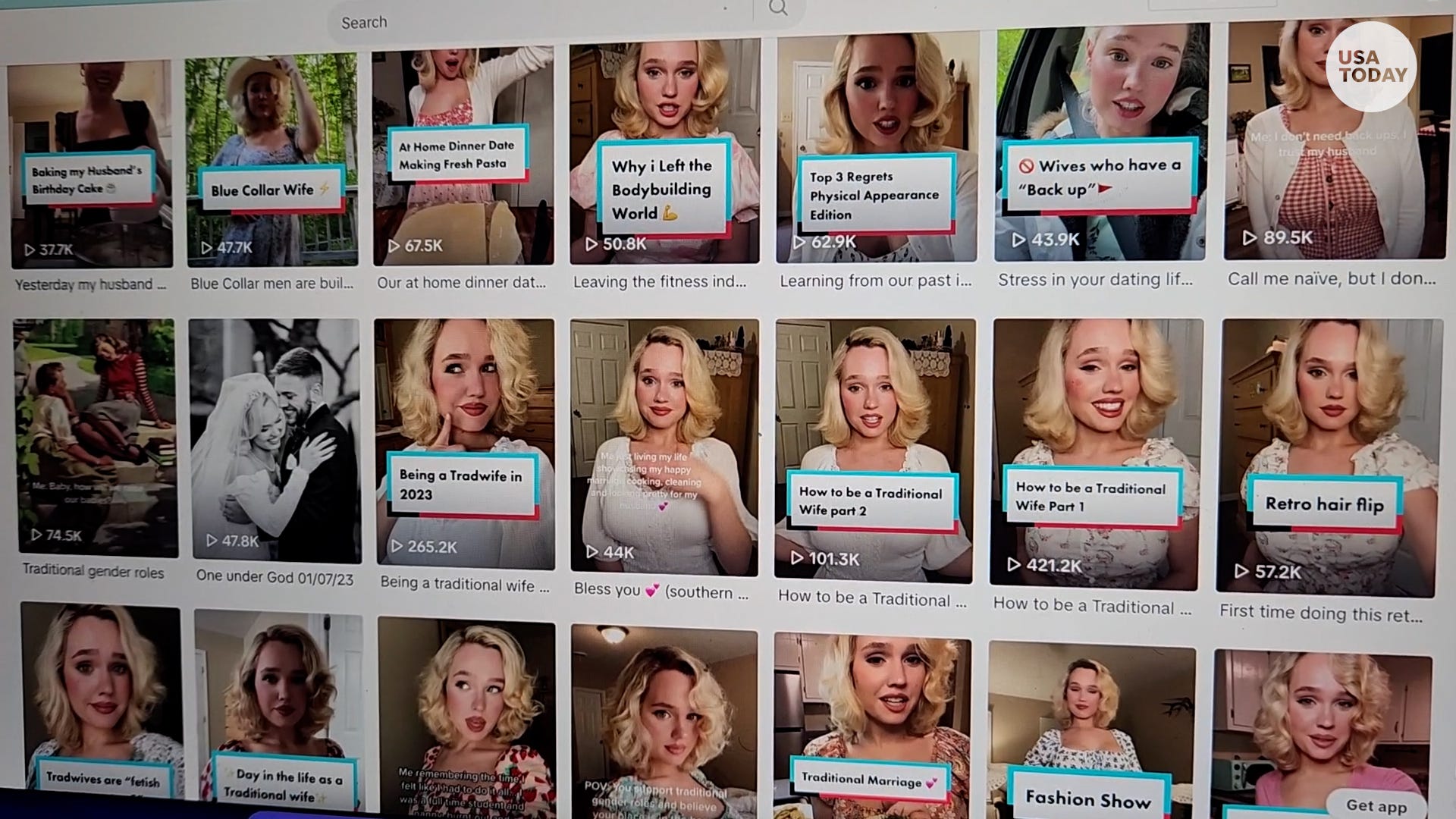Patriarchy Hannah built a following as the perfect trad wife. Was it all a lie?

She has 14 children. She dotes on her husband, Tony, who works in construction. She frequently discusses the importance of wives "submitting" to their husbands − and built a significant following online in doing so.
To many, she's the quintessential "trad wife." Or is she?
On X, the trad-wife influencer known as "Patriarchy Hannah" has come under scrutiny, after internet sleuths alleged the idealized, "traditional-wife" persona she presents online is a lie. The controversy has sent shockwaves through the trad-wife corner of the internet, where many looked to Patriarchy Hannah for advice on matters of family, marriage and faith.
In response, the Patriarchy Hannah account posted a since-deleted apology on X, according to screenshots circulating online and a report from NBC News. The person behind the account could not immediately be reached for comment, and the account on X has also been deleted.
“I just want to say that I am sorry for the lies I told and the hurt I caused," read the apology. "I never intended for this account to become as big as it did, and once things started snowballing, I enjoyed the relationships I’d built and didn’t know how to put an end to it."
Regardless of who Patriarchy Hannah actually is, experts say the debacle serves as an important reminder to approach what you see online with skepticism, particularly when it comes from an influencer touting a lifestyle that's unrealistic or unattainable for many.
"Anytime that people feel swindled or conned, there's going to be a visceral response to it," psychotherapist Stephanie Sarkis says. "We as humans generally trust in someone as who they say they are. So, when we find out that's not true, it brings up a lot of questions about human nature and also people feeling taken advantage of."
Why we need to be more skeptical
On the internet, the term "trad wives," short for "traditional wives," refers to a subgroup of women who choose to live as homemakers. Trad wives are typically conservative, usually Christians and post about things like cooking, cleaning and subservience to their husbands. Some emulate a wardrobe and aesthetic akin to women from the 1950s.
The Patriarchy Hannah account purported to be run by one of these women. It amassed over 25,000 followers on X, making it a significant presence in the online trad-wife community.
On Feb. 14, X user Ryan Duff posted a lengthy thread of alleged inconsistencies in Patriarchy Hannah's personal story. The thread went viral with over 3 million views.
Then came the apology.
“The bottom line is that I am not who I presented (myself) to be," the since-deleted Patriarchy Hannah post read. "I’m not going to be giving my reasons for why I started because I am not looking for sympathy here. It was wrong, and I humbly hope that you all can find it in your hearts to forgive me in the future."
Followers expressed a range of emotions, including shock, outrage and sadness.
"I’m not sure who the sadder people are in the Patriarchy Hannah debacle…" one user wrote. "The girl for perpetuating the fraud… or the people who wanted it to be real so bad they believed it."
Others have found the whole thing entertaining, like user Hilary Crowder: "Listen two things can be true: (1)The 'Patriarchy Hannah' situation is horrible, sad, and shows the depth of deception humans are capable of AND (2) I need another hit of this story because Netflix hasn’t produced anything as compelling as this dumpster fire in years."
If Patriarchy Hannah did fabricate her life story, she's not the only influencer to do so. Annabelle “Belle” Gibson, for instance, became an Instagram star while proclaiming she had an elixir that managed her terminal cancer. In reality, it was a con she implemented to launch a wellness empire that included a cookbook and an app. Netflix recently turned Gibson’s grift into a six-episode limited series called “Apple Cider Vinegar.”
Catfishing happens often and to varying degrees, thanks to the anonymity afforded by the internet. Stories of catfishing captivate us because they hit on a core human fear: that of being deceived, Sarkis says.
"It really calls into question our ideas of trustworthiness and how quickly someone can feel attached to someone that is having a shared experience," she says. This also goes for people who don't agree with Patriarchy Hannah or trad wives, but who still engaged with her posts. "If you didn't agree with the account, if you were still viewing it, you were still having some type of connection."
What the Patriarchy Hannah controversy says about trad wives
To some, the Patriarchy Hannah situation speaks to deeper issues within the trad wife movement.
Critics of trad wives often accuse them of promoting a lifestyle that's unattainable. As journalist and author Jo Piazza previously told Paste BN, the purported '50s sitcom life was just that: a television ideal, not a real one.
"It's a false nostalgia for a time that didn't exist for the majority of the population, and for a time that was incredibly demeaning, condescending and difficult for women," Piazza previously said of trad wives.
Trad wives tend to draw a lot of attention in general because their content hits on topics that are already polarizing: gender dynamics, relationship structures and politics.
The controversial nature of trad wives adds to the intrigue around Patriarchy Hannah.
"If you have a topic that's very polarizing, you're going to get the people that identify with it and the people that are against it," she says. "Anything that's polarizing draws attention from a large swath of people."
Contributing: Erin Jensen, Ariana Triggs, Claire Hardwick and David Oliver